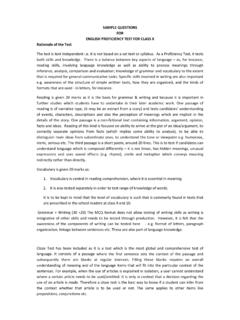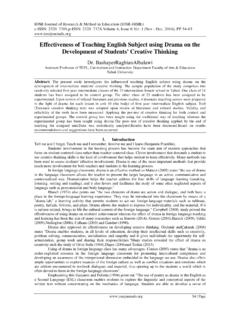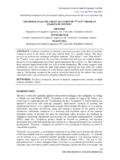Transcription of Problems Encountered by Arab EFL Learners - India
1 Language in India 19 11 : 3 March 2011 Loae Fakhri Ahmad Jdetawy, candidate Problems Encountered by arab EFL Learners LANGUAGE IN India Strength for Today and Bright Hope for Tomorrow Volume 11 : 3 March 2011 ISSN 1930-2940 Managing Editor: M. S. Thirumalai, Editors: B. Mallikarjun, Sam Mohanlal, B. A. Sharada, A. R. Fatihi, Lakhan Gusain, Jennifer Marie Bayer, S. M. Ravichandran, G. Baskaran, L. Ramamoorthy, Problems Encountered by arab EFL Learners Loae Fakhri Ahmad Jdetawy, candidate ======================================== ======= Abstract The purpose of this paper is to review the literature on Problems Encountered by arab EFL Learners focusing on the many Problems in English language learning and the reasons that lie behind these Problems .
2 This paper concludes that arab EFL Learners encounter many serious Problems in the four language skills, listening, speaking, reading and writing. It also concludes that the reasons that lie behind these Problems are many such as: English is not the mother tongue of the arab EFL Learners , arab Learners use Arabic as their formal language of communication, the lack of the target language exposure as spoken by its native speakers, the arab EFL Learners preference for using Arabic in EFL classrooms rather than English, the lack and weakness of the input in their language teaching context, the lack of the arab EFL Learners personal motivation, the inappropriateness and weakness of the English language curricula adopted by some academic institutions, etc.
3 Introduction arab countries make special efforts to facilitate the use of English language among their citizens in the present globalised era (Al- Khatib, 2000). English language started to be Language in India 20 11 : 3 March 2011 Loae Fakhri Ahmad Jdetawy, candidate Problems Encountered by arab EFL Learners introduced in the school curriculum in most arab countries in 1920s when most of these countries came under the British mandates. Consequently, English became a widespread language in many arab institutions and among arab Learners . Thus, teaching English language became the main focus and interest of most arab researchers (ibid). For years, researchers have investigated various Problems Encountered by arab EFL Learners , (e. g. Mourtaga 2004; Abdul Haq 1982; Wahba 1998; Abbad 1988; Rabab ah 2003).
4 In addition, many studies have been conducted in arab countries to investigate lexical, phonological, and syntactic errors made by arab EFL Learners ( , Abdul Haq 1982; Wahba 1998; Zughoul/Taminian 1984). Furthermore, many researchers such as: Abdul Haq (1982), Wahba (1998), and Abbad (1988), state that arab Learners of English encounter Problems in both speaking and writing. Consequently, the aim of this paper is to offer a better insight into the different Problems Encountered by arab EFL Learners . Study of the Problems Encountered Many researchers such as Zughoul (1983), Mukattash (1983), and Suleiman (1983) agree on some reasons which they believe to lie behind the Problems Encountered by arab EFL Learners while learning English. These include the lack of Learners personal motivation, the inappropriateness and weakness of the English language curricula adopted by some academic institutions, the lack of the appropriate and effective language environments, and the ineffective teaching methodology.
5 Two Types of Problems Mukattash (1983:196) points out that the arab EFL Learners encounter two types of Problems . The first problem is that students keep committing errors in syntax, morphology, pronunciation, and spelling. The second problem is that students are unable to express themselves comfortably and efficiently either when dealing with 'academic topics' or 'common everyday topics. Mukattash adds that the main reason that lies behind these Problems is the students inability to use English appropriately and correctly inside and outside the classroom. Reading Problems One of these various Problems Encountered by arab EFL Learners is the reading problem . Mourtaga (2004:10) states that arab EFL/ESL students, including the Palestinian ones, suffer from many reading Problems as a result of teachers' misunderstanding of the reading process, students' lack of the linguistic competence, differences between English and Arabic, and English spelling-pronunciation irregularities.
6 Spelling Problems Language in India 21 11 : 3 March 2011 Loae Fakhri Ahmad Jdetawy, candidate Problems Encountered by arab EFL Learners In her study that was conducted with 36 freshmen students majoring in translation at the College of Languages and Translation, King Saud University, Saudi Arabia, Al-Jarf (2007: 11) concludes that The fact that English spelling is more complex than that of Arabic, this is expected to pose several spelling difficulties for arab students particularly in the early stages of spelling development . The reasons for such a problem , as Al-Jarf argues, are communication breakdown, inadequate knowledge of the English spelling rules, influence of the Arabic spelling system, students' mispronunciation, interference between English words, and unfamiliarity with the American pronunciation (ibid: 11).
7 Difficulty with Comprehending Natural Spoken English Most of the arab EFL Learners are unable to fully comprehend natural spoken English delivered at normal speed. Hasan (2000) conducted a study about listening Problems Encountered by EFL Learners at Damascus University, Syria. Besides listening Problems , Hasan investigates Learners strategies, characteristics of the speaker, features of the listening text, attitudes of the listener, etc. The study concludes that EFL Learners at Damascus University experience a range of listening Problems . Semantic Errors Al-Shormani (2010) investigates semantic errors and the probable L1 and L2 sources which contribute to the committing of such errors by Arabic speaking Learners of English. He says that the sources of these errors vary between following different strategies such as translating form Arabic as in the case of some categories in lexical choice and collocation errors, applying Arabic rules to English as in derivativeness, the Arabic sound system as in the case of the absence of /p/ and /v/ in distortion due to spelling errors among others (ibid: 26).
8 Al-Shormani adds that it is the insufficient knowledge arab students have about second language (L2) semantic system that makes them commit such errors. Pronunciation Difficulties Another problem is the pronunciation problem which is Encountered by many of arab EFL Learners such as Egyptian EFL Learners . Wahba (1998) states "Egyptian students face certain Problems related to pronunciation. Some of these Problems are related to stress, others are related to intonation. However, most of these Problems can be attributed to the differences in pronunciation between English and Arabic" (ibid: 36). Despite English being the language of instruction in most of the Egyptian universities, Egyptian colloquial Arabic is the language of choice for most Egyptian students.
9 Students usually try to communicate in English but they always slip into Arabic (Schaub, 2000). Learners Compositions Language in India 22 11 : 3 March 2011 Loae Fakhri Ahmad Jdetawy, candidate Problems Encountered by arab EFL Learners In his study, Kambal (1980) analyzes errors in EFL Learners compositions. These compositions were written by first-year Sudanese University students. The study concludes that there were three types of error in the verb phrase: verb formation, tense, and subject-verb agreement made by these students. Furthermore, Tahaineh (2010) investigate kinds of errors made by Jordanian 1st, 2nd, and 3rd year university EFL students in the use of prepositions in written composition. The study concluded that EFL arab Jordanian students encounter serious difficulties in using the appropriate prepositions in their writing.
10 The tested were prepositions such as: by, in, on, to, with, of, etc. Tahaineh says that mother tongue interference (MTI) is a learning strategy that most foreign-language Learners fall back on especially in acquisition poor classroom situations where exposure to the language is confined to a few hours per week of formal instruction. The majority of errors made by the three groups are the result of the Learners mother tongue interference as the major source (1323 errors =58%) of the total errors 2290) (ibid: 98). Zughoul & Taminian (1984: 4) state that "Jordanian EFL students commit serious lexical errors while communicating in English." Abdul Haq (1982: 1) adds, "One of the linguistic areas in which students in the secondary cycle commit errors is in the writing skill".








